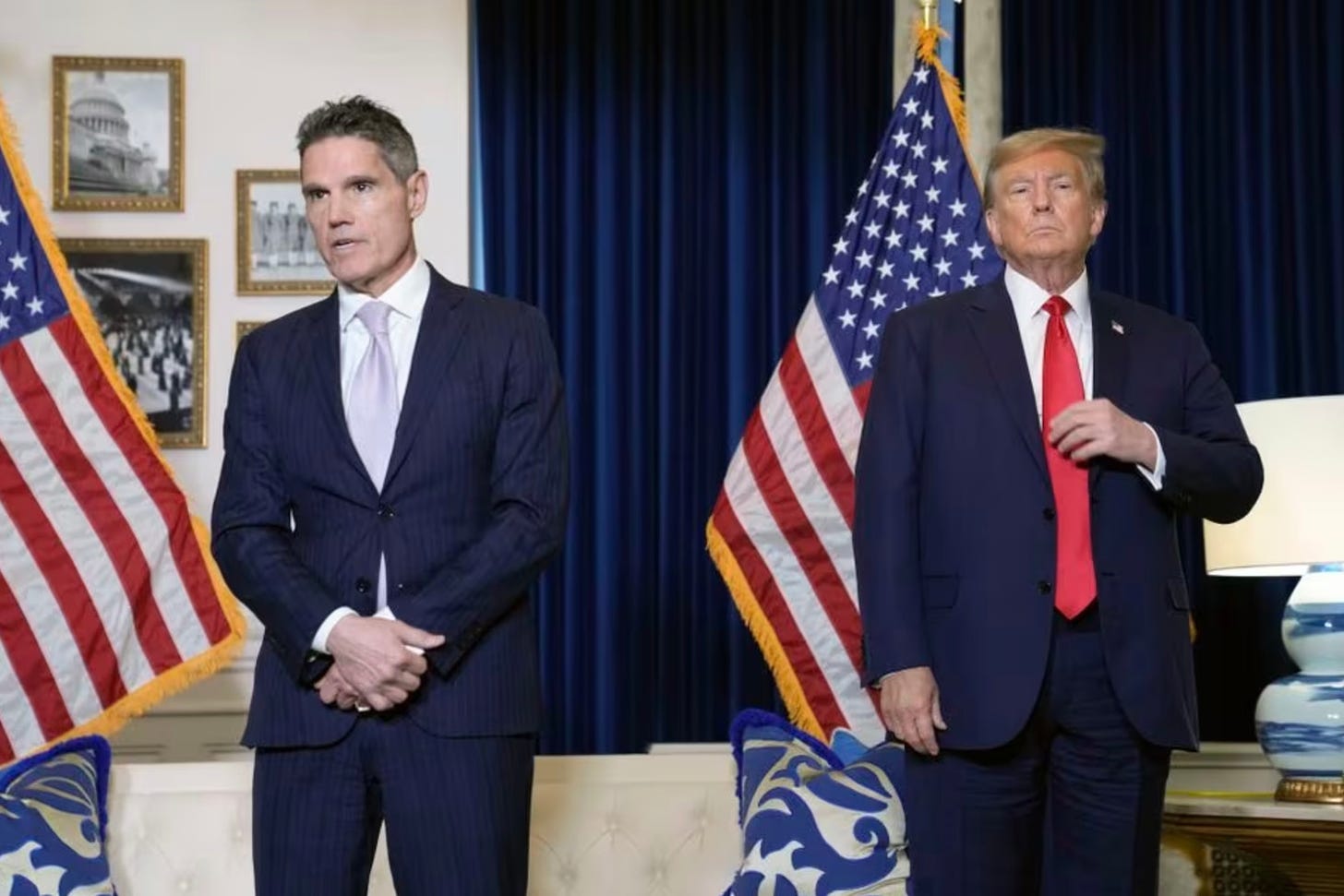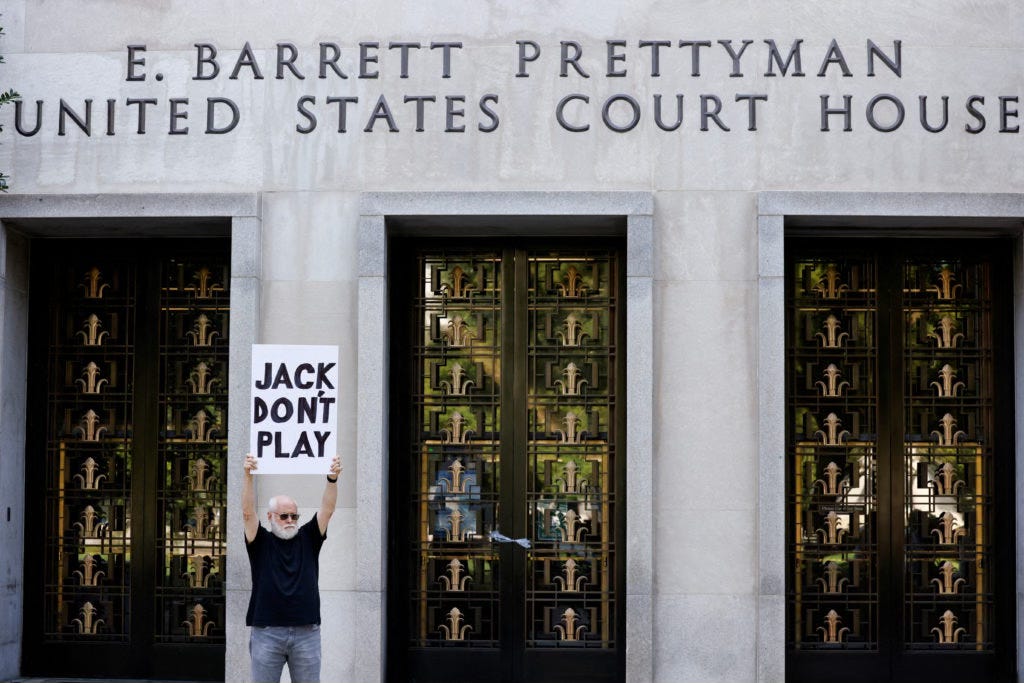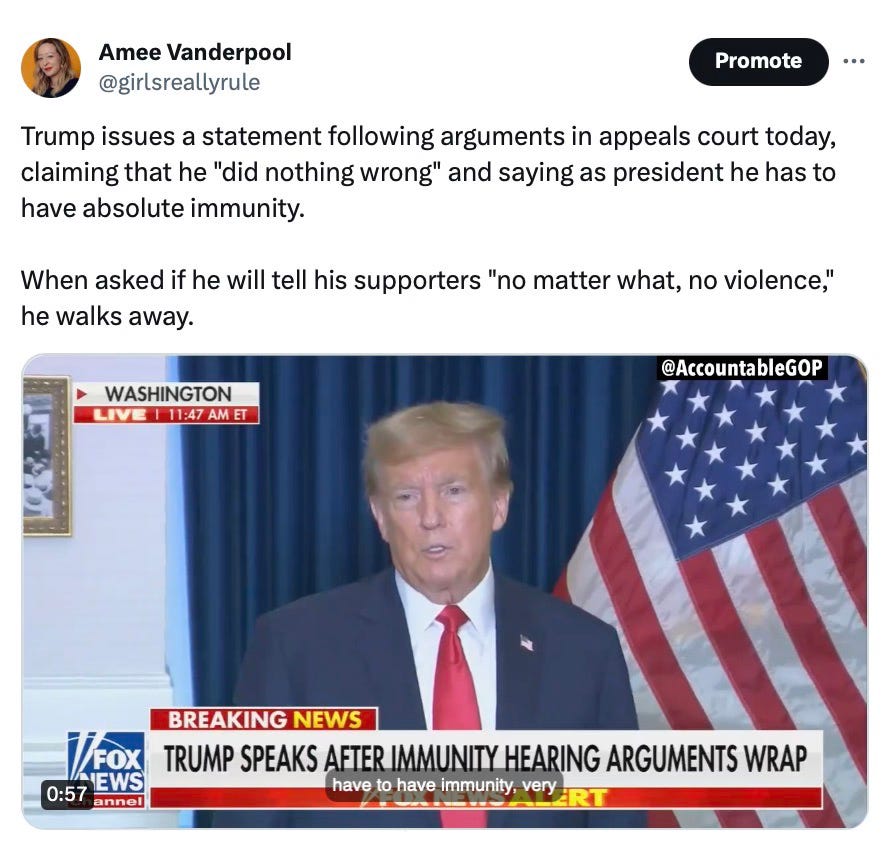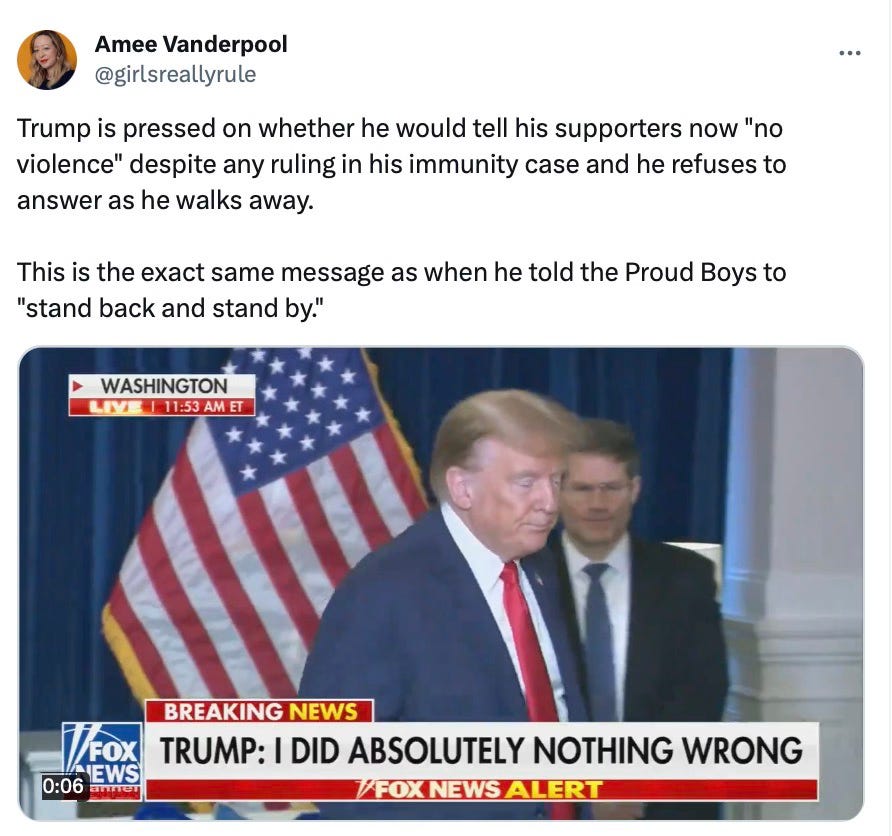
A panel of three federal appellate court judges heard oral arguments this morning in the US Court of Appeals for the District of Columba Circuit, and signaled they would reject Donald Trump’s claim that he is immune from prosecution on charges he plotted to overturn the 2020 election. The judicial panel — comprised of George H.W. Bush appointee Judge Karen Henderson and Biden appointees Judge Florence Pan and Judge Michelle Childs — heard the case on an expedited basis in order to allow Trump’s trial to begin as scheduled in several weeks.
The judges said and did nothing to suggest they accepted Trump's immunity argument, presented by defense attorney John Sauer, that relies on the premise that all of the charges arise out of Trump’s official acts as president. The panel discussed options about how they might rule in this case, which is ultimately likely to be appealed to the United States Supreme Court, regardless of the outcome. Sauer has already requested that the appeals court put its decision on hold to allow the former president to appeal to either the full DC Circuit of 11 judges, en banc, or the US Supreme Court.

The three judges conducting the hearing today could ultimately dismiss Trump’s appeal, finding that he does not possess unfettered presidential immunity, and the trial would resume pending a stay from the Supreme Court. They might also issue a ruling that leaves some of the immunity issues unresolved, which is a path that would put more pressure on the Supreme Court to take the case and issue a ruling.
The panel could also dismiss the appeal brought by Trump on the basis that he has no right to bring an appeal at this stage of the litigation, allowing the trial to proceed. Judge Childs suggested that the court may be required by United States Supreme Court precedent to avoid ruling on the immunity issue now because criminal defendants typically can’t appeal issues in their cases until after trial.
I have posted a link to the complete session of judicial questions and answers here. I recommend you read the quick summary of this morning’s proceedings below and then come back to listen to the arguments in their entirety. These are the same issues that will continue to be litigated on appeal. Becoming familiar with the content will help give you a better understanding of the appeals process, as well as the basics of the case, which is still currently scheduled for March 4, 2024.
Background
In December, US District Court Judge Tanya Chutkan denied Trump’s attempt to dismiss the charges against him on the basis of his alleged presidential immunity and other constitutional grounds. The underlying case has been put on hold while the appeals process plays out.
Trump’s appeal today arises from the four-count indictment in Washington DC Federal Court, including charges of conspiracy to defraud the United States and conspiracy to obstruct an official proceeding. Donald Trump has pleaded not guilty and a trial date has been scheduled for March 4, 2024.
Trump’s Argument
Trump's attorney argued that presidents are immune from criminal prosecution for actions taken in office, unless they are first impeached by the House and convicted by the Senate. Sauer told the judges that allowing the criminal prosecution of a former president over actions taken while in office would "open Pandora's Box from which this nation may never recover."
Judge Childs immediately went into a series of questions about whether the DC Circuit has jurisdiction to hear Trump's appeal at this time — which the panel previously told lawyers for Trump and the government to be prepared to discuss today."We don't have an explicit communication here with respect to anything in the Constitution or statute," Childs told Sauer.
The appeals court questioned this broad claim of presidential immunity, and asked Trump Attorney David Sauer a series of extreme hypothetical scenarios under this premise to show how the argument was overly broad.
Judge Florence Pan asked the following: "You're saying a president could sell pardons, could sell military secrets, could order SEAL Team 6 to assassinate a political rival?" Sauer answered by saying that a sitting president would only be criminally culpable if Congress had impeached him for his actions, first.
Trump’s attorney made no mention about whether removing a president from office would be a necessary prerequisite. “Once you concede that presidents can be prosecuted under some circumstances, your separation of powers argument falls away,” Judge Pan stated. If the Court accepted Sauer’s argument, then they would have to dismiss the case for failure of Congress to impeach before this hearing.
It’s also important to note fundamentally that if Sauer’s argument were legally correct, it would mean that the Founding Fathers, who sought to ensure that each branch of government was separate, meant to place a political body in charge of a criminal prosecution rather than the courts. Under this premise, Sauer could easily argue that this appeal should be held in the House of Representatives.
Judge Karen Henderson cited another part of a Constitutional provision that mandates that the president has a duty to ensure that laws are faithfully executed. “I think it’s paradoxical to say that his constitutional duty to take care that the laws be faithfully executed allows him to violate criminal law,” she said. Judge Henderson also expressed concern that a ruling saying the president does not have immunity would lead to politically-driven prosecutions of future presidents. “How do we write an opinion that would stop the flood gates?”
Department of Justice’s Argument
James Pearce, a member of special counsel Jack Smith's team, warned the court that accepting Sauer's view of criminal liability for a former president following impeachment and conviction by the two chambers of Congress is "wrong for textual, structural, historical reasons, and a host of practical ones."
"It would mean that if a former president engages in assassination, selling pardons, these kinds of things and then isn't impeached and convicted, there is no accountability for that individual," Pearce said. "Never before has there been allegations that a sitting president has, with private individuals and using the levers of power, sought to fundamentally subvert the democratic republic and the electoral system," continued Pearce, “and frankly, if that kind of fact pattern arises again, I think it would be awfully scary if there weren't some sort of mechanism by which to reach that criminally."
Trump Attorney Gets Political in Court
Sauer described Trump as President Joe Biden’s “number one political opponent” and “greatest political threat.” In one hypothetical, Sauer said denying immunity to Trump would make it possible for Biden to be prosecuted in federal court in Texas after leaving office for failing to secure the border with Mexico. During his rebuttal argument near the end of the hearing, Sauer made a point to announce that Donald Trump was “leading in every poll.”
Trump Speaks to the Press
After today’s court session was adjourned, Trump spoke to reporters, saying he had done "nothing wrong" and warning that the prosecution was a "threat to democracy." Trump insisted that his acts were part of his presidential responsibilities in fighting election fraud, despite the lack of evidence of any widespread fraud in 2020, a conclusion reached by the then-Trump administration's own Justice Department.
On Monday, Trump suggested that if the court does not rule in his favor and he wins the presidential election, he would have President Joe Biden indicted. During this latest press conference on Tuesday, Donald Trump was asked: “You just used the word bedlam, will you tell your supporters now, no matter what, no violence?” Trump refused to answer and just walked away.
Amee Vanderpool writes the SHERO Newsletter, is an attorney, published author, contributor to newspapers and magazines, and an analyst for BBC radio. She can be reached at avanderpool@gmail.com or follow her on Twitter @girlsreallyrule.
Paid subscriptions and one-time tributes embedded in each article allow me to keep publishing critical and informative work that is sometimes made available to the public — thank you. If you like this piece and want to support independent journalism further, you can forward this article to others, get a paid subscription or gift subscription, or donate as much as you like today.






If Trump wins in November of 2024, we are done as a democracy. And no, I don't think that I'm being hyperbolic.